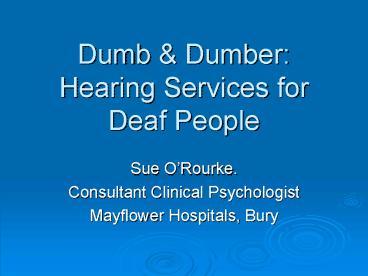Dumb - PowerPoint PPT Presentation
1 / 17
Title:
Dumb
Description:
Deaf people as a cultural and linguistic minority : BSL, Deaf ... Oralism vs Total Communication. Choices in education: mainstreaming/ deaf units/ deaf schools ... – PowerPoint PPT presentation
Number of Views:557
Avg rating:3.0/5.0
Title: Dumb
1
Dumb Dumber Hearing Services for Deaf People
- Sue ORourke.
- Consultant Clinical Psychologist
- Mayflower Hospitals, Bury
2
You have to be deaf to understand.
3
Deafness
- 11000,
- deaf, HoH, deafened, hearing impaired, Deaf
- 50-70 000 BSL users
- Deaf people as a cultural and linguistic minority
BSL, Deaf clubs, cultural norms, shared
experiences, Deaf humour, Deaf Olympics, etc etc - BSL as a recognised minority language
4
Deafness and Development
- 90 Deaf children have hearing parents
- Problems around diagnosis and professional advice
- Oralism vs Total Communication
- Choices in education mainstreaming/ deaf units/
deaf schools
5
Underachievement
- Failure of the education system for Deaf children
- Lack of access to higher education
- Lack of access to professional training
- Training in a second language/problems with
written English
6
And successes
- Deaf people in higher education
- Professional training
- Greater access eg via BSL interpreters and
notetakers - Social workers and OTs
- Salford University RMN training for Deaf and
hearing - Clinical psychology training
7
Deafness and Mental Health
- Few epidemiological studies
- Higher rates of behavioural problems than in
hearing children (Hindley 1997) - Early descriptions eg (Denmark 1985) suggest not
higher rates of serious MI but methodological
problems - Now suggestions of higher prevalence of
psychotic disorders in deaf, possibly subgroups
eg rubella deafened - More problems with life as a result of lack of
experience, poor coping skills - relating back
to developmental experiences
8
Deafness and Forensic Mental Health
- Lack of research
- Young et al (2001) looked at all Deaf referrals
since 1968 - High referred for assessment had no mental
disorder - High referred for fitness to plead assessment
- High sexual offences
9
Issues for Specialist forensic services for Deaf
people
- Lack of evidence base
- ?base rates of offending
- Issues in risk assessment
- Inability to use most psychometrics
- Adaptations of treatment packages
- Where to discharge to?
- Prisons!
10
Models of care
- Integration
- Bolt on support
- Specialist services
11
Integration
- Placing a Deaf person in a service designed
for hearing people with little or no additional
support and no specialist expertise. - we manage
- He understands when he wants to
- we write it down
12
Bolt on
- The addition of support services such as an
interpreter to a service designed for hearing
people - Problems securing funds for interpreter and to
teach staff deaf awareness and BSL - How to assess when the interpreter is not there?
- Peer group?
- Access to treatment and therapy?
13
Specialist services
- A service designed to be culturally and
linguistically appropriate for Deaf people. - All staff Deaf awareness BSL trained
- BSL as main language of the environment including
assessment and treatment - Knowledge about cultural norms
- Development of treatments from a Deaf
perspective - Employment of Deaf staff
14
Specialist services
- John Denmark Unit, Prestwich Hospital, Manchester
- Old Church National Deaf Services, London
- Denmark House, Queen Elizabeths Psychiatric
Hospital, Birmingham - Rampton Hospital
- Mayflower Hospitals, Bury
15
Prisons
- How many Deaf prisoners?
- ? 70-100 estimated at any one time
- Additional mental health problems? how are they
assessed? - No specialist services
- No strategic development
- No access to programmes
- Particular difficulties for lifers
16
Prison Inreach Project
- Rampton and Mayflower Hospitals
- Assessment of all Deaf prisoners
- Rates of mental disorder
- Need for referral to mental health services
- Needs within the prison
- NSF, DDA and Sign of the Times
17
You have to be Deaf to understand.































